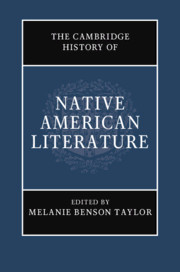Book contents
- The Cambridge History of Native American Literature
- The Cambridge History of Native American Literature
- Copyright page
- Contents
- Figures
- Contributors
- Introduction: What Was Native American Literature?
- Part I Traces and Removals (Pre-1870s)
- Part II Assimilation and Modernity (1879–1967)
- Part III Native American Renaissance (Post-1960s)
- 14 Rethinking the Native American Renaissance: Texts and Contexts
- 15 Marginally Mainstream: Momaday, Silko, Erdrich, and Alexie
- 16 Indigenous Lives, Visual Autobiographies
- 17 Indigenous Writing in Canada
- 18 Reservation Realities and Myths in American Literary History
- 19 Mapping the Future: Indigenous Feminism
- 20 Queer Sovereignty
- 21 Contemporary Indigenous American Poetry
- 22 Contemporary Native North American Drama
- Part IV Visions and Revisions: 21st-Century Prospects
- Index
- References
15 - Marginally Mainstream: Momaday, Silko, Erdrich, and Alexie
from Part III - Native American Renaissance (Post-1960s)
Published online by Cambridge University Press: 18 September 2020
- The Cambridge History of Native American Literature
- The Cambridge History of Native American Literature
- Copyright page
- Contents
- Figures
- Contributors
- Introduction: What Was Native American Literature?
- Part I Traces and Removals (Pre-1870s)
- Part II Assimilation and Modernity (1879–1967)
- Part III Native American Renaissance (Post-1960s)
- 14 Rethinking the Native American Renaissance: Texts and Contexts
- 15 Marginally Mainstream: Momaday, Silko, Erdrich, and Alexie
- 16 Indigenous Lives, Visual Autobiographies
- 17 Indigenous Writing in Canada
- 18 Reservation Realities and Myths in American Literary History
- 19 Mapping the Future: Indigenous Feminism
- 20 Queer Sovereignty
- 21 Contemporary Indigenous American Poetry
- 22 Contemporary Native North American Drama
- Part IV Visions and Revisions: 21st-Century Prospects
- Index
- References
Summary
This chapter explains how particular Native writers in the US have come to serve as reference points and to receive widespread recognition, while others, equally worthy, have not. In particular, I focus on N. Scott Momaday (Kiowa), Leslie Marmon Silko (Laguna Pueblo), Louise Erdrich (Turtle Mountain Ojibwe), and Sherman Alexie (Spokane-Coeur d'Alene) as the four Native authors who have been most frequently singled out for attention and "canonized" within mainstream American culture. I identify factors that created a favorable reception for their works, and most importantly, I explore what it means for these authors to be "marginally mainstream." On the one hand, to be "marginally mainstream" is to be deemed worthy of recognition by the critical establishment, which often entails overemphasizing "universal" literary qualities to the detriment of tribally specific elements. At the same time, however, to be "marginally mainstream" suggests that these texts continue to speak eloquently to Native audiences in meaningful ways.
Keywords
- Type
- Chapter
- Information
- The Cambridge History of Native American Literature , pp. 271 - 286Publisher: Cambridge University PressPrint publication year: 2020



